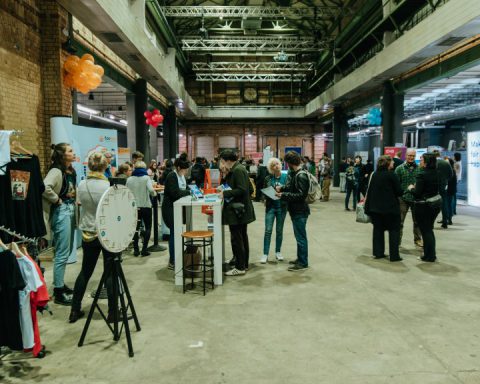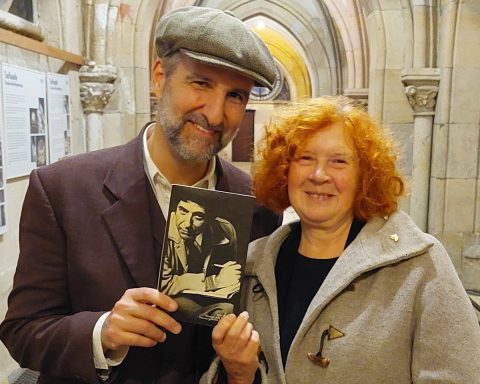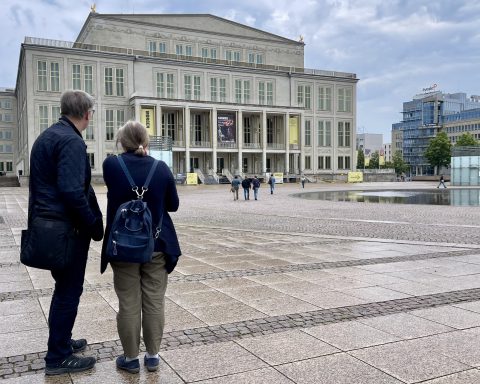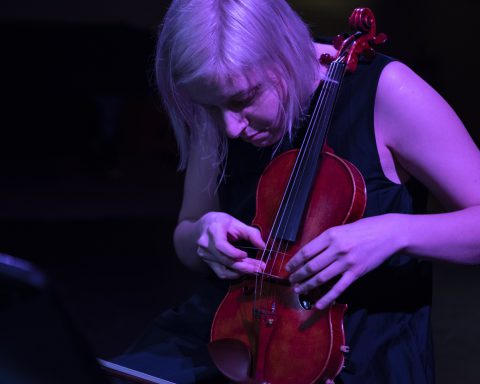On my sixth birthday, my dad wished upon me something that I have never forgotten:
I wish you to always be with a bag in your hands, traveling around the globe.
This is an absurd wish for a six year old girl, starting school in a couple of months and a couple of years later starting to learn the piano.
This wish has sealed my fate, and I started traveling at a very early age because of music. The piano hasn’t accompanied me as it perfectly does with other music instruments; it was the clarinet that became my companion.
Berlin was the first city outside Greece that I visited, and I fell in love with it immediately. “Only a fool wouldn’t,” as I used to say. It was a clear decision, in my 14 years, that Berlin would be the place where I would go to study the clarinet. Berlin was my first stop abroad, and simultaneously the place where I got to know myself and become a musician. Berlin has been my base ever since, even though life has led me to other places for work.

Being a music student at the famous Berlin University of the Arts is something brilliant for a young musician. The city was THE place to be, full of energy, music and arts at its best. The high level of talent of the fellow students just made you want to get better and better and achieve more and more. This is basically ground zero of the classical music industry.
Only a few music students make it into symphony orchestras, and even fewer make a career as soloists.
Most of the music students live through teaching in conservatories or music schools. They do not get to fulfill the big dream of playing in a famous orchestra. They do not get to make a good living from what they have sacrificed the most: Hours and hours of practicing their instrument, a fortune they paid to get the best instruments possible – which could give them a better sound, and most of all the serenity and peace of mind that get lost to playing and auditioning while having to prove that they are the best.
I have been one of the lucky ones, who always had a job in an orchestra, and teaching to me was not a means to make ends meet. Some years performing at the Greek National Opera and teaching the country’s most talented clarinet students – at the State Conservatory of my hometown Thessaloniki – was what I gave back to Greece, until the financial crisis hit the country and, with it, me.
Living in a financially stricken country meant that wages were slashed and payments were significantly delayed. Having endured 13 months unpaid, and the accompanying decrease in quality of life, I decided to leave Greece and return to Germany.
Luck was on my side as well, so I was accepted as a clarinet player at the Police Orchestra of Berlin-Brandenburg, and as a teacher for clarinet at the municipal conservatory of Potsdam. But I was saddened to have left Greece, my family, friends and beloved students to return to Berlin, which in the meantime had changed so much.
It was not the Berlin I had known and I was not the person I thought I was.
Everyone in Greece would call me “Berliner,” but being back in Berlin I didn’t feel so much like it at all. Berlin had changed and I had changed too. Those five years that I lived in Greece changed me a lot. I struggled with myself so much about who I was. I was trying very hard to find my identity.
So I was blessed with two very good jobs, which paid my rent and gave me a decent life again. But I was asking myself quite often:
Is this all that I have ever wanted?
Playing music and teaching had been my whole life, but should it remain so for the next 30 years to come?
Realizing that this was what my life was going to be, I totally freaked out and started thinking what I could do that could be even more creative than making music. The answer came from an orchestra manager I had known for many years in Berlin. He told me that orchestra management is what would perfectly fit my vivid and creative character, and somehow this idea clicked.
I got accepted at the Freie Universität Berlin, at the Institute for Arts and Media Administration, and so I went back to school. This was a two-year Master’s program – and a very hard one at that, especially for a 34-year-old musician who had never in her life written a simple essay.
Needless to say, it was a grueling two years of studying and working that was fueled by my will to change my career.
Without the full support of my fellow students, my colleagues and director at my orchestra, I wouldn’t be where I am now, and I will forever be grateful to them.
As a fresh orchestra manager, I started working at the Metropolis Orchester Berlin, and later on at the world’s most famous youth orchestra, the Gustav Mahler Jugendorchester in Vienna. That meant that I had to leave Berlin once again, this time for the Austrian capital.
Fast-forward to almost one year later. Grateful for the period I lived and worked in Vienna, I returned to Germany, taking up the position of Orchestra Manager at the Saxon Wind Philharmonic. It’s not far from Leipzig, in a small and peaceful town called Bad Lausick.
In Bad Lausick, I found an orchestra of 35 amazing musicians who love their job and are so passionate about it. The Saxon Wind Philharmonic is the only professional orchestra in Germany relying almost exclusively on wind instruments and percussion. The only string instrument that gets a pass is the double bass!
Leipzig has been my home ever since last September, and I can only say how happy I am to live in Germany again, in a city so vivid, so artistic, cultural and profoundly human like Leipzig.
It hasn’t been a long time, but I can surely say that I have fallen in love with the city. A big reason for this are the musicians and wonderful colleagues at the office.
The path from being a musician into being an orchestra manager has been a long one, going through the two years of studying orchestra management and playing at the orchestra, until I finally jumped to “the other side” and ended my career as a musician.
I never regret this. Being an orchestra manager is something that keeps me alert at all times. Every day is different; I speak with so many different people from different branches with different personalities, and all that so as to organize the concerts as best as possible.
I know what it is to be a musician, because I am one myself – once a musician, always a musician. Therefore, I know what my orchestra needs and I try to give it to them. Though the biggest task all of us orchestra managers have is to assure the sustainability of our orchestra, and pass it on in the best condition to the future orchestra managers.
Serving music from a totally different perspective is what has enriched my life and given me a new vision to continue forward. Still every once in a while, I pick up my clarinet again and jump back to “the other side” – and this feels just great.
By Barbara Venetikidou
Barbara is Orchestra Manager of the Saxon Wind Philharmonic. They have a concert coming up in Leipzig on 2 February.











